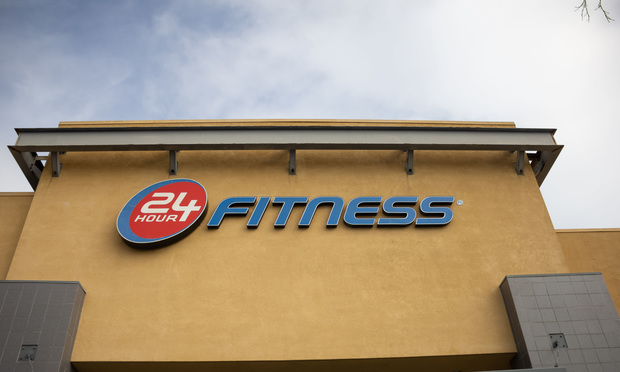Prominent Plaintiffs Firms Preparing COVID-19 Lawsuits
Class actions by DiCello Levitt Gutzler and Bursor & Fisher were filed Friday over membership fees at 24-Hour Fitness and room and board fees at Arizona State University.
March 30, 2020 at 04:36 PM
5 minute read
Prominent plaintiffs firms are preparing lawsuits over COVID-19, with some class actions already filed over membership fees at 24-Hour Fitness and room-and-board fees at Arizona State University.
DiCello Levitt brought a complaint Friday against the Arizona Board of Regents alleging that the University of Arizona, Arizona State University and Northern Arizona University have refused to refund the costs of room, board and certain fees for the unused portion of the spring 2020 semester after closing their campuses due to the COVID-19 outbreak.
Adam Levitt, a partner at the Chicago-based firm, said other schools are doing the right thing by crediting students.
"Unsurprisingly, our phones are ringing off the hook because of this, from other students and their families who are absolutely horrified," he said. "All we're seeking is fairness. All we're seeking is to get the unused portion of the students' room and board fees and campus fees reimbursed to them."
Another firm, Bursor & Fisher, brought a complaint alleging that 24-Hour Fitness USA Inc. has continued to charge monthly membership fees to millions of its customers' credit and debit cards even though it closed its 430 gyms across the country March 16.
"Thus, defendant has made the deliberate decision to bill its customers out of roughly $120 million per month while its customers do not have access to defendant's gyms," says the complaint, filed in Northern District of California federal court. "The sole reason defendant's customers pay monthly membership fees is to have access to defendant's gyms, which is advertised to be available 24 hours per day."
Both cases reflect how some larger plaintiffs firms are gearing up for lawsuits coming out of the coronavirus pandemic. On Friday, New York firms Milberg Phillips Grossman and Sanders Phillips Grossman teamed up to create a Coronavirus Litigation Task Force, which involves about 30 attorneys.
"There's so many complex reasons that affect different areas of law," said Tina Bullock, a senior attorney and registered nurse at Sanders Phillips Grossman, who helped create the task force. "We don't see these COVID-related issues as something that one boutique firm can handle. You need the expertise in products liability, antitrust, price gouging, and how that's affecting the supply chain of personal protective equipment, and you need people who have that vast experience in those different areas."
She said the task force, which also includes Greg Coleman Law in Knoxville, Tennessee, plans to focus on a wide range of claims, including workers' compensation and products liability involving protective gear for those potentially exposed to the coronavirus. Potential contamination prompted Cardinal Health to recall 9.1 million surgical isolation gowns Jan. 30.
"One of the problems we're seeing is not only a lack of personal protective equipment, but we're researching misuse of the personal protective equipment, as well as contamination of personal protective equipment that has been recalled," she said. "Any worker who is deemed an essential business and is out there working, and they can contract coronavirus, we're going to look at whether they were adequately protected."
Bullock said the task force could file its first lawsuit this week.
The task force also would look at insurance coverage claims for restaurant or hospital chains with $120,000 in losses, class actions and antitrust claims—an area already spawning lawsuits over alleged price gouging and invalid health claims involving consumer products.
The suits against 24-Hour Fitness and Arizona Board of Regents are both nationwide class actions brought on behalf of consumers asking for their money back.
The Arizona case, filed in Arizona's federal court, seeks a class action of about 140,000 college students and their families. The suit alleges that the Board of Regents offered rent credits of 10% to 20% housing costs for the next two academic years, but Levitt called that "a coupon settlement."
"They're driving more business to themselves for their own bad acts," he said. "You paid us cash. We're not going to give you cash in return, but if you give us more cash in the future, we'll give you a small discount. That doesn't work in the class action context. It shouldn't work in this context."
A representative of the Arizona Board of Regents did not respond to a request for comment.
Levitt said his firm was looking at other lawsuits tied to COVID-19.
"In any situation, unfortunately, when a crisis hits, certain elements in our society act on their baser instincts and take advantage of other people, or they miss what's really important," he said. "Certain people are focused on the wrong things and doing the wrong things. We are looking at a series of situations where companies are taking advantage of consumers and other companies in this crisis and either retaining monies or failing to pay monies that actually need to be paid."
Bursor & Fisher's Yeremey Krivoshey, a partner in Walnut Creek, California, who filed the 24-Hour Fitness lawsuit, declined to comment, and a representative of the company, based in San Ramon, California, did not respond to a request for comment.
Another firm, Wigdor in New York, filed a similar class action Thursday on behalf of more than 600,000 members of Town Sports International, which operates 186 gyms along the East Coast known under the names New York Sports Clubs, Boston Sports Clubs, Washington Sports Clubs and Philadelphia Sports Clubs.
This content has been archived. It is available through our partners, LexisNexis® and Bloomberg Law.
To view this content, please continue to their sites.
Not a Lexis Subscriber?
Subscribe Now
Not a Bloomberg Law Subscriber?
Subscribe Now
NOT FOR REPRINT
© 2025 ALM Global, LLC, All Rights Reserved. Request academic re-use from www.copyright.com. All other uses, submit a request to [email protected]. For more information visit Asset & Logo Licensing.
You Might Like
View All

4th Circuit Upholds Virginia Law Restricting Online Court Records Access
3 minute read
Plaintiffs Attorneys Awarded $113K on $1 Judgment in Noise Ordinance Dispute
4 minute readLaw Firms Mentioned
Trending Stories
- 1Gunderson Dettmer Opens Atlanta Office With 3 Partners From Morris Manning
- 2Decision of the Day: Court Holds Accident with Post Driver Was 'Bizarre Occurrence,' Dismisses Action Brought Under Labor Law §240
- 3Judge Recommends Disbarment for Attorney Who Plotted to Hack Judge's Email, Phone
- 4Two Wilkinson Stekloff Associates Among Victims of DC Plane Crash
- 5Two More Victims Alleged in New Sean Combs Sex Trafficking Indictment
Who Got The Work
J. Brugh Lower of Gibbons has entered an appearance for industrial equipment supplier Devco Corporation in a pending trademark infringement lawsuit. The suit, accusing the defendant of selling knock-off Graco products, was filed Dec. 18 in New Jersey District Court by Rivkin Radler on behalf of Graco Inc. and Graco Minnesota. The case, assigned to U.S. District Judge Zahid N. Quraishi, is 3:24-cv-11294, Graco Inc. et al v. Devco Corporation.
Who Got The Work
Rebecca Maller-Stein and Kent A. Yalowitz of Arnold & Porter Kaye Scholer have entered their appearances for Hanaco Venture Capital and its executives, Lior Prosor and David Frankel, in a pending securities lawsuit. The action, filed on Dec. 24 in New York Southern District Court by Zell, Aron & Co. on behalf of Goldeneye Advisors, accuses the defendants of negligently and fraudulently managing the plaintiff's $1 million investment. The case, assigned to U.S. District Judge Vernon S. Broderick, is 1:24-cv-09918, Goldeneye Advisors, LLC v. Hanaco Venture Capital, Ltd. et al.
Who Got The Work
Attorneys from A&O Shearman has stepped in as defense counsel for Toronto-Dominion Bank and other defendants in a pending securities class action. The suit, filed Dec. 11 in New York Southern District Court by Bleichmar Fonti & Auld, accuses the defendants of concealing the bank's 'pervasive' deficiencies in regards to its compliance with the Bank Secrecy Act and the quality of its anti-money laundering controls. The case, assigned to U.S. District Judge Arun Subramanian, is 1:24-cv-09445, Gonzalez v. The Toronto-Dominion Bank et al.
Who Got The Work
Crown Castle International, a Pennsylvania company providing shared communications infrastructure, has turned to Luke D. Wolf of Gordon Rees Scully Mansukhani to fend off a pending breach-of-contract lawsuit. The court action, filed Nov. 25 in Michigan Eastern District Court by Hooper Hathaway PC on behalf of The Town Residences LLC, accuses Crown Castle of failing to transfer approximately $30,000 in utility payments from T-Mobile in breach of a roof-top lease and assignment agreement. The case, assigned to U.S. District Judge Susan K. Declercq, is 2:24-cv-13131, The Town Residences LLC v. T-Mobile US, Inc. et al.
Who Got The Work
Wilfred P. Coronato and Daniel M. Schwartz of McCarter & English have stepped in as defense counsel to Electrolux Home Products Inc. in a pending product liability lawsuit. The court action, filed Nov. 26 in New York Eastern District Court by Poulos Lopiccolo PC and Nagel Rice LLP on behalf of David Stern, alleges that the defendant's refrigerators’ drawers and shelving repeatedly break and fall apart within months after purchase. The case, assigned to U.S. District Judge Joan M. Azrack, is 2:24-cv-08204, Stern v. Electrolux Home Products, Inc.
Featured Firms
Law Offices of Gary Martin Hays & Associates, P.C.
(470) 294-1674
Law Offices of Mark E. Salomone
(857) 444-6468
Smith & Hassler
(713) 739-1250










